上教版(2020)选择性必修第三册 Unit 3 Mind and body Reading and interaction(29张PPT)
文档属性
| 名称 | 上教版(2020)选择性必修第三册 Unit 3 Mind and body Reading and interaction(29张PPT) |
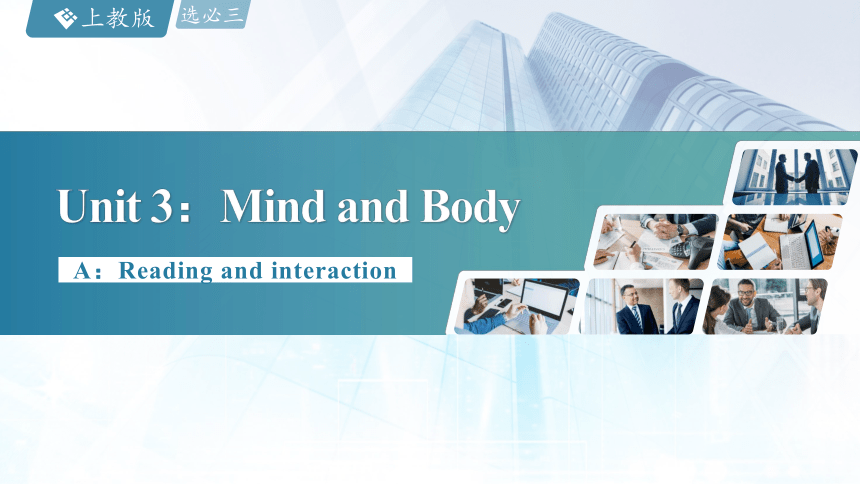
|
|
| 格式 | zip | ||
| 文件大小 | 4.2MB | ||
| 资源类型 | 教案 | ||
| 版本资源 | 上教版(2020) | ||
| 科目 | 英语 | ||
| 更新时间 | 2023-03-11 14:34:20 | ||
图片预览

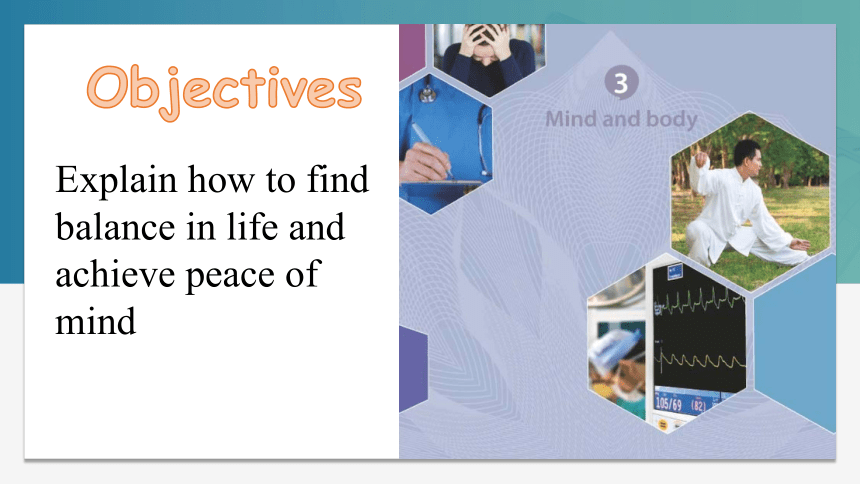
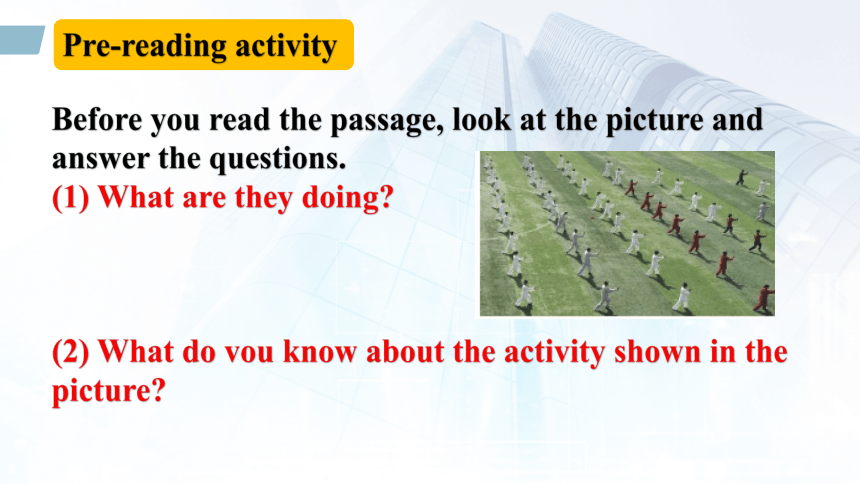
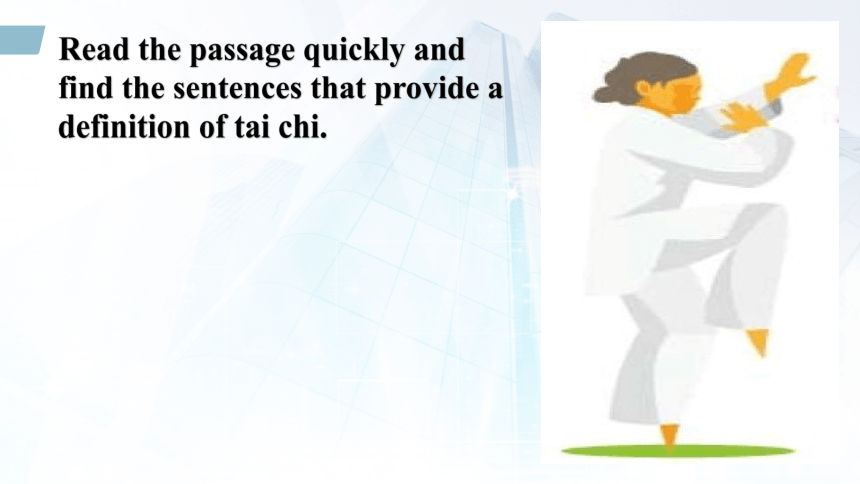
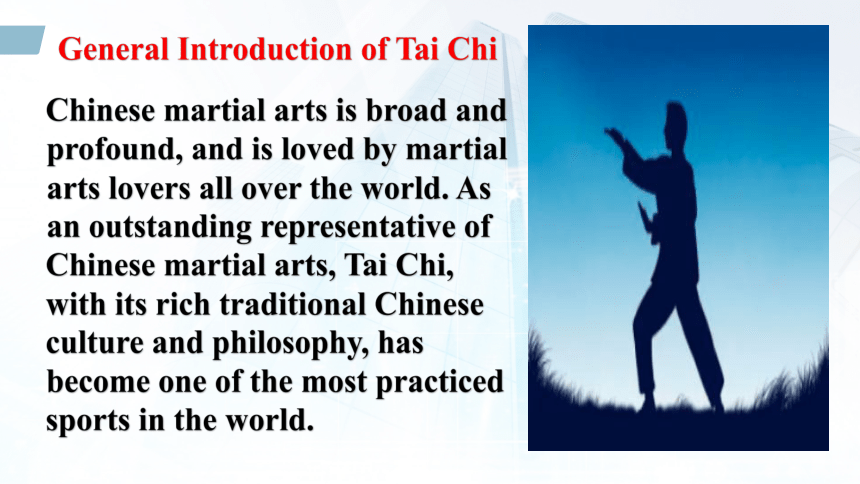
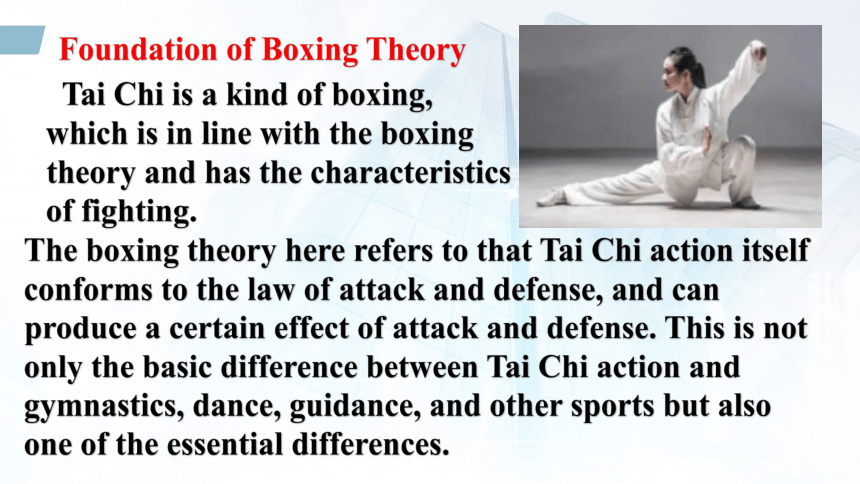
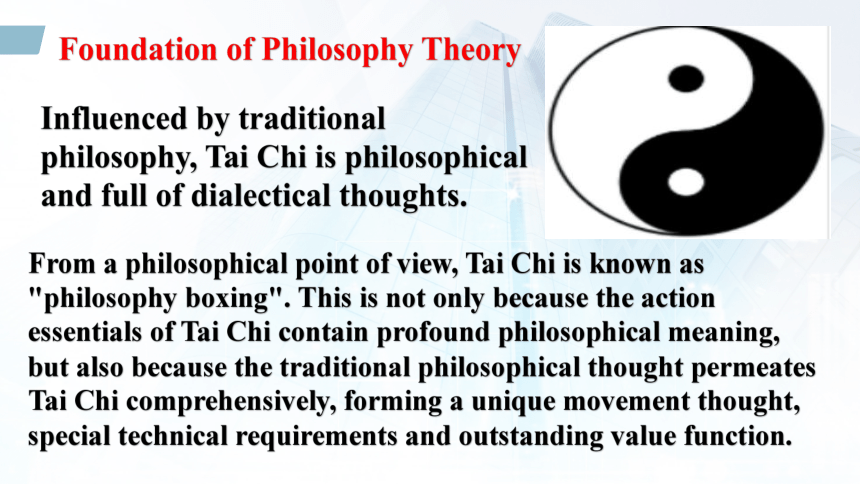
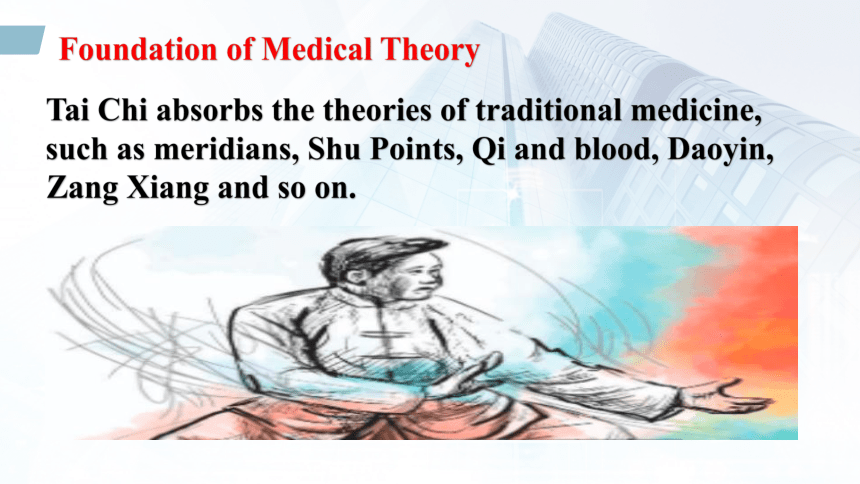
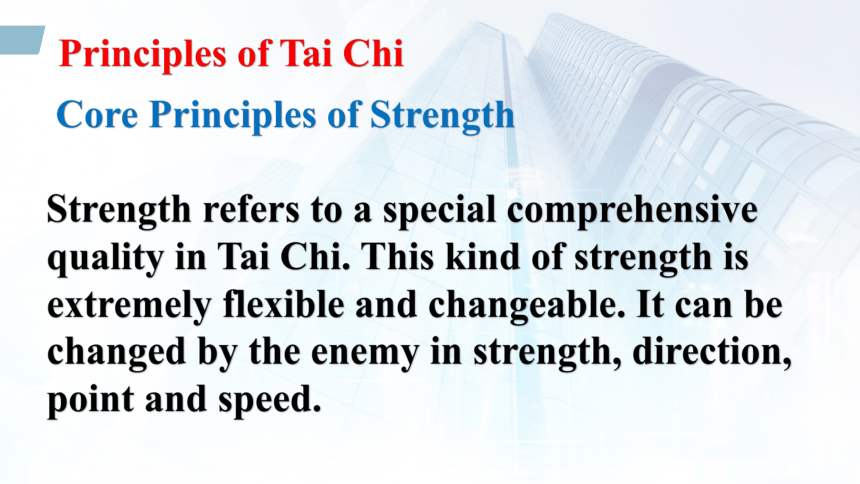
文档简介
(共29张PPT)
A:Reading and interaction
Unit 3:Mind and Body
上教版
选必三
Objectives
Objectives
Explain how to find balance in life and achieve peace of mind
Pre-reading activity
Before you read the passage, look at the picture and answer the questions.
(1) What are they doing
(2) What do vou know about the activity shown in the picture
Read the passage quickly and find the sentences that provide a definition of tai chi.
General Introduction of Tai Chi
Chinese martial arts is broad and profound, and is loved by martial arts lovers all over the world. As an outstanding representative of Chinese martial arts, Tai Chi, with its rich traditional Chinese culture and philosophy, has become one of the most practiced sports in the world.
Foundation of Boxing Theory
Tai Chi is a kind of boxing, which is in line with the boxing theory and has the characteristics of fighting.
The boxing theory here refers to that Tai Chi action itself conforms to the law of attack and defense, and can produce a certain effect of attack and defense. This is not only the basic difference between Tai Chi action and gymnastics, dance, guidance, and other sports but also one of the essential differences.
Foundation of Philosophy Theory
Influenced by traditional philosophy, Tai Chi is philosophical and full of dialectical thoughts.
From a philosophical point of view, Tai Chi is known as "philosophy boxing". This is not only because the action essentials of Tai Chi contain profound philosophical meaning, but also because the traditional philosophical thought permeates Tai Chi comprehensively, forming a unique movement thought, special technical requirements and outstanding value function.
Foundation of Medical Theory
Tai Chi absorbs the theories of traditional medicine, such as meridians, Shu Points, Qi and blood, Daoyin, Zang Xiang and so on.
Principles of Tai Chi
Core Principles of Strength
Strength refers to a special comprehensive quality in Tai Chi. This kind of strength is extremely flexible and changeable. It can be changed by the enemy in strength, direction, point and speed.
Principles of Tai Chi
Principle of All Movements
Tai Chi compares heaven and earth to a big universe, and the human body to a small universe. This kind of movement is a coordinated movement of the whole body under the control of consciousness. Therefore, Tai Chi requires as much participation as possible in the movement process, and it is a highly coordinated and delicate movement, which should be understood continuously in practice.
Why Do We Chinese Practice Tai Chi
1.Activate self-repair system:
With the growth of age, people's self-repair system is slowly degenerating. Tai Chi can regulate body and mind, promote body balance, and activate body repair function.
2. Dredge meridians:
If you insist on practicing Tai Chi, it is conducive to dredge meridians.
Why Do We Chinese Practice Tai Chi
3. Relax the nervous system:
It can make people calm and comfortable, relax the nervous system, and relieve dizziness.
4. Enhance heart function:
Although Tai Chi is slow, it can stimulate Qi and blood and enhance heart function.
Why Do We Chinese Practice Tai Chi
5. Strengthen blood vessels:
In medicine, Tai Chi can enhance the elasticity of blood vessels, reduce the possibility of vascular rupture, and also enhance the elasticity of the whole body.
6.Strengthen the muscles and bones:
Through practicing Tai Chi, the strength of muscles and ligaments is enhanced, and the joints are flexible.
7. Smooth blood circulation:
Tai Chi can easily open channels and collaterals, enhance blood circulation and metabolism.
Reading
Searching for balance in life
Comprehension work
Read the passage and answer the questions.
(1) What does the concept of yin-yang mean
(2) What is the central concept of tai chi
(3) What is the fundamental aim of doing tai chi
(4) What is the writer's experience with tai chi
(5) What are some of the difficult parts of tai chi
(6) How does the writer benefit from doing tai chi
Read the summary below and fill in each blank with a suitable word based on the language of the passage. You may change the form if necessary.
Deep reading
Work in groups and discuss how to explain a concept or an idea. When we provide explanations, we make the text easier to understand. There are a number of strategies to achieve this purpose. Read the quotes. Match each concept or idea that is clarified to the strategy the writer used. Then explain why.
The concepts or ideas clarified by the writer:
return to the starting position
tai chi principles applied in everyday life
tui shou Qi tai chi opposites in life
Strategies for clarifying these concepts or ideas:
a Using figurative language: likening something to something else
b Providing examples: giving specific cases, types, etc.
c Rephrasing the idea: expressing the same idea in other words, or through a translation
d Providing a definition: clearly stating what something is or means
e Expanding: using independent sentences to further develop the idea
Work in pairs and discuss the questions.
(1) Would vou like to practise tai chi Why
(2) How could you apply the principles of tai chi in your life Please give an example.
Mini-project
Looking for a perfect match
The Chinese philosophy of yin-yang emphasizes the balance between opposing forces.
What are the opposing forces in our lives How can we reconcile the conflict between them and achieve peace of mind
Work in groups. Match the sentence halves in A and B into meaningful sayings.
Discuss how their meanings are related to the topic of the passage: finding balance in life and achieving peace of mind.
Share your ideas within your group.
Select one person to report on behalf of your group.
Focus on language
Read the passage again. Find some language points in the passage and list them in the blanks.
(1) Pairs of adjectives or nouns used for emphasis or clarification (e.g. smooth, effortless movements; postures and motions)
(2) Figurative language (e.g. sleep like a baby)
Translate the Chinese parts into English by using the words given in brackets.
(1) The significance of a man is ____________________
(不在于他所获得的)but rather what he longs to attain. (attain)
(2)_____________________(开始始手动力);habit is what
keeps you going. (motivation)
(3) Seeds of faith are always within us;_________________
(有时候一场危机促使它们生长).(crisis)
(4)________________________________
(如果你从未遭遇过尴尬或伤痛) it means you never take any chances. (embarrassed)
(5) Max is only clever at_______________________
(推卸责任). (shift)
(6) There is nothing _____________________.
(能与 来自戈母永怛的爱相提井论)。(unceasing)
(7)__________________(如果每年改正一个坏习惯),even the worst of us can in time become thoroughly good. (root)
(8)_________________(任何你想得到的物质的东西仅仅是个象征):you want it not for itself, but because it will content your spirit for the moment. (symbol)
A:Reading and interaction
谢谢您的观看
上教版
选必二
A:Reading and interaction
Unit 3:Mind and Body
上教版
选必三
Objectives
Objectives
Explain how to find balance in life and achieve peace of mind
Pre-reading activity
Before you read the passage, look at the picture and answer the questions.
(1) What are they doing
(2) What do vou know about the activity shown in the picture
Read the passage quickly and find the sentences that provide a definition of tai chi.
General Introduction of Tai Chi
Chinese martial arts is broad and profound, and is loved by martial arts lovers all over the world. As an outstanding representative of Chinese martial arts, Tai Chi, with its rich traditional Chinese culture and philosophy, has become one of the most practiced sports in the world.
Foundation of Boxing Theory
Tai Chi is a kind of boxing, which is in line with the boxing theory and has the characteristics of fighting.
The boxing theory here refers to that Tai Chi action itself conforms to the law of attack and defense, and can produce a certain effect of attack and defense. This is not only the basic difference between Tai Chi action and gymnastics, dance, guidance, and other sports but also one of the essential differences.
Foundation of Philosophy Theory
Influenced by traditional philosophy, Tai Chi is philosophical and full of dialectical thoughts.
From a philosophical point of view, Tai Chi is known as "philosophy boxing". This is not only because the action essentials of Tai Chi contain profound philosophical meaning, but also because the traditional philosophical thought permeates Tai Chi comprehensively, forming a unique movement thought, special technical requirements and outstanding value function.
Foundation of Medical Theory
Tai Chi absorbs the theories of traditional medicine, such as meridians, Shu Points, Qi and blood, Daoyin, Zang Xiang and so on.
Principles of Tai Chi
Core Principles of Strength
Strength refers to a special comprehensive quality in Tai Chi. This kind of strength is extremely flexible and changeable. It can be changed by the enemy in strength, direction, point and speed.
Principles of Tai Chi
Principle of All Movements
Tai Chi compares heaven and earth to a big universe, and the human body to a small universe. This kind of movement is a coordinated movement of the whole body under the control of consciousness. Therefore, Tai Chi requires as much participation as possible in the movement process, and it is a highly coordinated and delicate movement, which should be understood continuously in practice.
Why Do We Chinese Practice Tai Chi
1.Activate self-repair system:
With the growth of age, people's self-repair system is slowly degenerating. Tai Chi can regulate body and mind, promote body balance, and activate body repair function.
2. Dredge meridians:
If you insist on practicing Tai Chi, it is conducive to dredge meridians.
Why Do We Chinese Practice Tai Chi
3. Relax the nervous system:
It can make people calm and comfortable, relax the nervous system, and relieve dizziness.
4. Enhance heart function:
Although Tai Chi is slow, it can stimulate Qi and blood and enhance heart function.
Why Do We Chinese Practice Tai Chi
5. Strengthen blood vessels:
In medicine, Tai Chi can enhance the elasticity of blood vessels, reduce the possibility of vascular rupture, and also enhance the elasticity of the whole body.
6.Strengthen the muscles and bones:
Through practicing Tai Chi, the strength of muscles and ligaments is enhanced, and the joints are flexible.
7. Smooth blood circulation:
Tai Chi can easily open channels and collaterals, enhance blood circulation and metabolism.
Reading
Searching for balance in life
Comprehension work
Read the passage and answer the questions.
(1) What does the concept of yin-yang mean
(2) What is the central concept of tai chi
(3) What is the fundamental aim of doing tai chi
(4) What is the writer's experience with tai chi
(5) What are some of the difficult parts of tai chi
(6) How does the writer benefit from doing tai chi
Read the summary below and fill in each blank with a suitable word based on the language of the passage. You may change the form if necessary.
Deep reading
Work in groups and discuss how to explain a concept or an idea. When we provide explanations, we make the text easier to understand. There are a number of strategies to achieve this purpose. Read the quotes. Match each concept or idea that is clarified to the strategy the writer used. Then explain why.
The concepts or ideas clarified by the writer:
return to the starting position
tai chi principles applied in everyday life
tui shou Qi tai chi opposites in life
Strategies for clarifying these concepts or ideas:
a Using figurative language: likening something to something else
b Providing examples: giving specific cases, types, etc.
c Rephrasing the idea: expressing the same idea in other words, or through a translation
d Providing a definition: clearly stating what something is or means
e Expanding: using independent sentences to further develop the idea
Work in pairs and discuss the questions.
(1) Would vou like to practise tai chi Why
(2) How could you apply the principles of tai chi in your life Please give an example.
Mini-project
Looking for a perfect match
The Chinese philosophy of yin-yang emphasizes the balance between opposing forces.
What are the opposing forces in our lives How can we reconcile the conflict between them and achieve peace of mind
Work in groups. Match the sentence halves in A and B into meaningful sayings.
Discuss how their meanings are related to the topic of the passage: finding balance in life and achieving peace of mind.
Share your ideas within your group.
Select one person to report on behalf of your group.
Focus on language
Read the passage again. Find some language points in the passage and list them in the blanks.
(1) Pairs of adjectives or nouns used for emphasis or clarification (e.g. smooth, effortless movements; postures and motions)
(2) Figurative language (e.g. sleep like a baby)
Translate the Chinese parts into English by using the words given in brackets.
(1) The significance of a man is ____________________
(不在于他所获得的)but rather what he longs to attain. (attain)
(2)_____________________(开始始手动力);habit is what
keeps you going. (motivation)
(3) Seeds of faith are always within us;_________________
(有时候一场危机促使它们生长).(crisis)
(4)________________________________
(如果你从未遭遇过尴尬或伤痛) it means you never take any chances. (embarrassed)
(5) Max is only clever at_______________________
(推卸责任). (shift)
(6) There is nothing _____________________.
(能与 来自戈母永怛的爱相提井论)。(unceasing)
(7)__________________(如果每年改正一个坏习惯),even the worst of us can in time become thoroughly good. (root)
(8)_________________(任何你想得到的物质的东西仅仅是个象征):you want it not for itself, but because it will content your spirit for the moment. (symbol)
A:Reading and interaction
谢谢您的观看
上教版
选必二
同课章节目录
